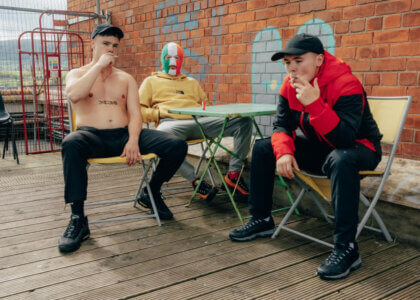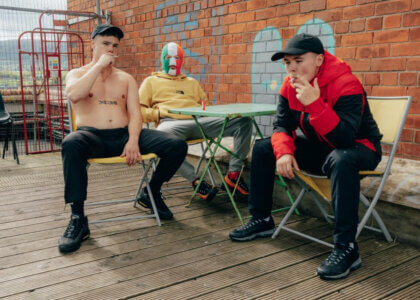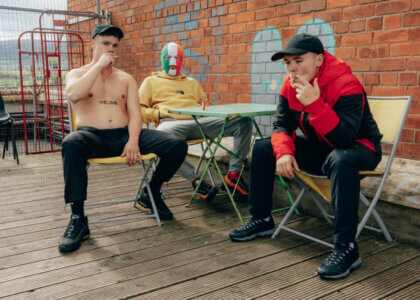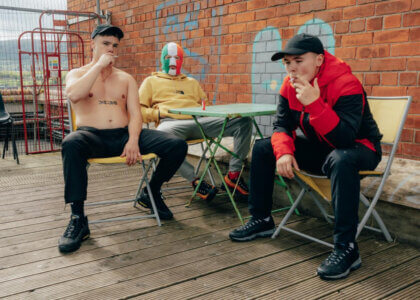Kneecap Are Proud Of Their Roots
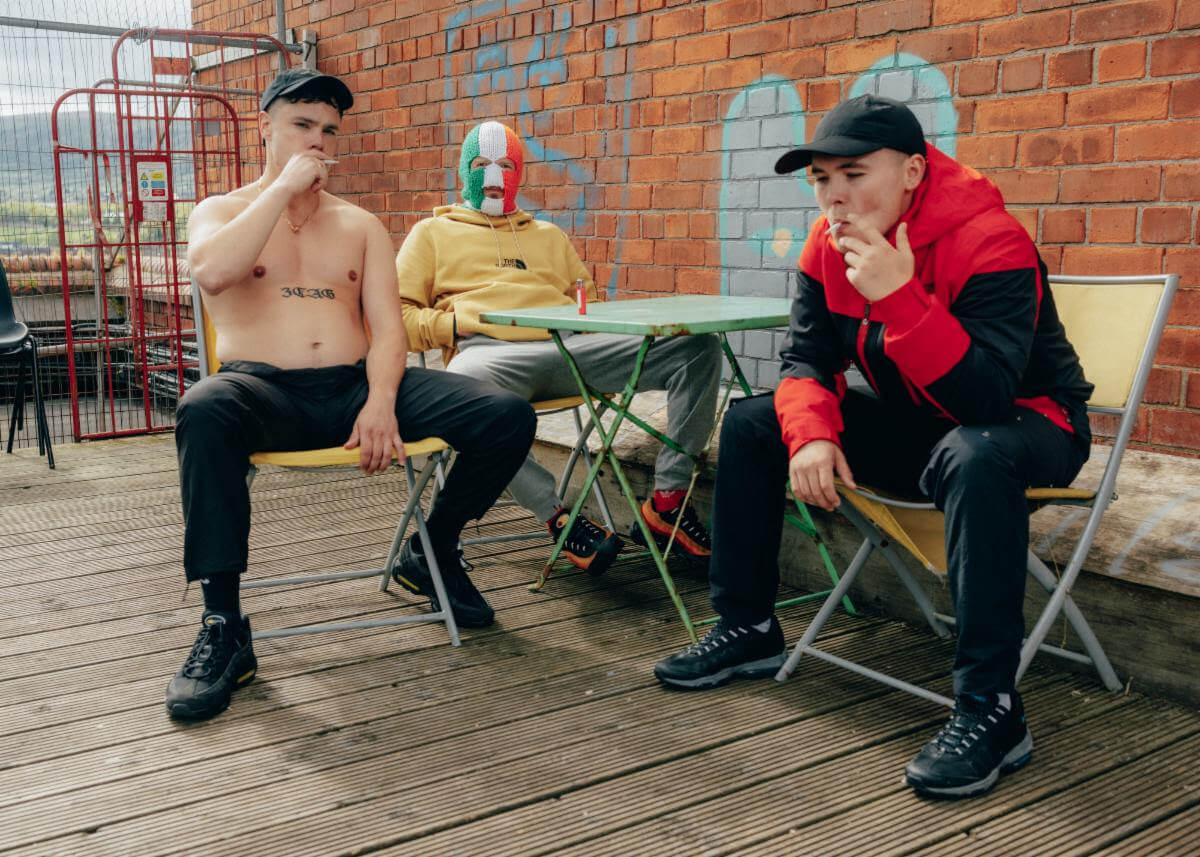
On the title track of Kneecap’s debut record, Fine Art, the Belfast trio address their audience (or, perhaps, it’s more targeted to their adversaries of which they’ve had their fair share of in the media) with a sharp quip: “So you’re wondering why we take ages to release music? We’re always on stages / All over in different places, rockin balaclavas on our faces.” Since the release of Kneecap’s debut single, “C.E.A.R.T.A” (the Irish for “rights”) in 2017, which was followed by their searing mixtape 3CAG the following year, the trio have continued to challenge and alter people’s perceptions across a number of pertinent political, social and cultural topics with their music. Fine Art is a testament to this, and an immensely accomplished body of work in grabbing your attention from the moment you step into The Ruzz, the fictional pub where all of the chaos and charm of the record unfolds over 18 brilliantly charged tracks.
Móglaí Bap, one third of the Belfast hip-hop group completed by Mo Chara and DJ Próvaí, spoke to Northern Transmissions over Zoom, having just landed home from New York where the band had been to promote their forthcoming debut feature, Kneecap, at the Tribeca Film Festival. The film, starring Michael Fassbender and the trio draws on Kneecap’s early experiences as a band in Belfast, became the first Irish language feature to premiere at the Sundance Film Festival in January of this year. We spoke about how working on the film informed their songwriting, their excitement in being part of revitalizing the Irish language and their experience in the studio making their vital debut.
Northern Transmissions: Kneecap has really captivated people’s attention in the last few years and it’s been amazing to see the reaction people are having to your music and paying attention to what you’re saying, as well, on a social and political level. How have you been finding that?
Móglaí Bap: Yeah, it’s crazy. Obviously we have the debut album coming out and then the movie will be coming out in a month or so. I think it’s unprecedented for any band to have these two things going on at the same time so we’re just so busy. We haven’t really had time to process it because we’re doing the two things at the same time. We recently had two 6-hour long days of interviews back-to-back and the label was saying that they haven’t seen bands doing that in a long time. But yeah, it’s really cool because I think it’s unusual for a band to have a movie out before they die! So, it’s been quite an unusual experience.
NT: Yeah, you’re already joining the likes of The Beatles, The Monkees and The Spice Girls in that regard. I’ve been really loving listening to Fine Art and especially going between that and your debut mixtape 3CAG. It’s cool to hear the throughline of your character and personality in it being developed sonically with the production. You worked with Toddla T, who produced the record with you. Tell me about that collaboration and the process of making Fine Art because I believe you went into the studio with a completely different batch of songs?
Móglaí Bap: Yeah, we had a lot of tunes done and then Covid happened, so we were writing tunes during a different time period. When Covid happened, it set us back like it did for a lot of bands. I think when we went to London, we got to meet Toddla T and a friend-of-a-friend had told us that he liked us. And I got his number off someone who got his number off someone else and I just got in touch and said, ‘Do you want to do a tune together?’ and he invited us over the next day. Hip-hop in England, in general, is far more advanced than it is in Ireland. I think with the quality of his production that was why we really wanted to create something new with him. We had a collaborative process in terms of the creativity, obviously we wrote everything, but he got involved sonically with the instrumentals. And because of that, we sort of started on a new project, in a sense, because we had this extra person involved with it. We wrote “Fine Art”, which was basically the first track for the album, in like two hours by the time we finished that. Once we did that, we just asked him if he’d do the album and he was like ‘100%!’.
NT: It really feels like the collaboration between you and Toddla T worked very well because, as I said, it has so much of what made your mixtape so unique but there’s a definite sonic progression on the record. In terms of the narrative structure, too, I enjoyed how with Fine Art, Kneecap exists within the fictional pub called The Ruzz and we follow the events of a night out with you and encounter some other people along the way. As you mentioned earlier, there’s the Kneecap film that’s coming out soon and I know that project goes back about 4 years now from when you were initially approached to do it. Did working within the realm of film and the ways of effectively building a story inform how you wrote the songs for the record?
Móglaí Bap: I suppose, maybe subconsciously, it definitely did but at the same time we were always interested in creating a story and a narrative in our songs. Even earlier songs with that lower production we had like “Gael Gigolos” where we owe dissident Republicans money so we turned to being gigolos for old people as a means of making money! So we were interested in these over the top stories. On our first mixtape we had, in the intro, a group called The Radical Republicans Against Drugs, which actually ended up being like the bad guys in the movie. I think a lot of the songs that we had already made influenced the outline of the movie and we had that song “Fenian Cunts” back in the day about cross community relations, as you would call it. That was a big theme in the movie, as well. So, they do work hand-in-hand in a sense and I think, just in general, storytelling was always a central part of our music. I think the idea of a concept album came up with us trying to tie the whole album together. I don’t know, I hadn’t heard a concept album in a while where it was all tied in together. Especially with so many different genres mixed in together. It was a challenge for us to not make it feel like a load of different little singles just squashed together. We didn’t want that to happen. But I think we managed to kind of intertwine them somewhat.
NT: It’s such a visual record, I could see the packed room of The Ruzz and almost feel the warmth of the room. There’s so much detail in the record, both sonically and lyrically. “Harrow Road” was one song in particular that I felt had to be based on a real night out.
Móglaí Bap: Yeah, it’s a true story! The story maybe has a little added drama to it but most of the story happened. Then, the next day we were in the studio and we just did that whole track based on what had happened. That’s quite similar to what we do for most of our tracks, even back to the initial mixtape. We had “Your Sniffer Dogs Are Shite” which was based on a sniffer dog that jumped on me but I had nothing on me and then we had “Get Your Brits Out”, we did that after we were on the BBC News because we said ‘Get your Brits out’ the day before Prince William was in the same venue. We definitely always draw on our own personal experiences and try to use that as a core element to the songs.
NT: Yeah, and I know that’s such a core component in your songs, but I was interested to hear more about songs like “Sick In The Head” where you share more of a personal vulnerability in exploring your mental health. While your songs examine a lot of what’s going on socially and politically around you, did you find that you were also leaning into what was going on internally and express that in your music?
Móglaí Bap: Yeah. Obviously, in our songs, youth culture and drugs would have been quite like a central theme and with this album we wanted to show the ups-and-downs of the reality of this lifestyle because you can’t always stay up, you have to come down at some stage. But definitely, “Sick In The Head” was a kind of ode to our own understanding, even though there’s a perception of us being a bit wild and whatever. We have an understanding that if you abuse something it’ll be detrimental to your health. The last track on the album, “Way Too Much”, It’s like the end of the night and, you know, you can keep going and keep chasing the dragon, as they say, but sometimes you just have to put yourself to bed! Obviously, the album goes up and down and you have “Parful”, as well, which is a more dancey tune.Yeah, so there was “Better Way To Live” and “Sick In The Head” that touch more on mental health and have a more introspective look at that. I think that came from that time period, with some of these themes, which was just post-Covid. All of these things were going through our heads and we wanted to put them down in a song and then intertwine it with us still wanting to go have a good time and party, but we now had an understanding that the longevity of these types of things isn’t realistic.
NT: I think fans also appreciate that. People who enjoy your music appreciate when you’re open and honest with them and hopefully they can see themselves in your music too.
Móglaí Bap: Yeah and I think a really interesting thing with Kneecap, in comparison to other hip-hop groups and just from my experience of going to see hip-hop groups, is that a lot of the gigs, the fanbase would be quite male-dominated. I think because we use the Irish language and rap in Irish, that’s gotten a lot of women interested in our music because I think language, in general, in essence is quite a feminine thing. I studied Irish in university and most of the people in my class were women. And even in the language itself, all the names of rivers in Ireland are all feminine. And, you know, it’s called your mother-tongue, so it definitely resonates with women in that way. That’s something that we always wanted to maintain. We don’t want a load of guys beating the heads off each other in the middle of a gig. I think the album emulates that we want to touch on that, even though we could come across a bit braggadocious and a bit masculine, that we have this other side that we respect and we know that it’s important to have that feminine side that men should stay in contact with.
NT: Yeah, absolutely. Actually, when you said that about women and language, it reminded me of an interview you did where you mentioned a show you played in San Francisco, I think, and you saw a woman in the crowd that was singing all the words to your songs and you were talking to her after and she didn’t know a word of Irish!
Móglaí Bap: Yeah, she knew every word and had the perfect pronunciation for all the songs. Then, afterwards, we came up to her and started speaking Irish and she was like, ‘No, I don’t speak Irish, I just learned all your words!’. Down in San Diego, there were a lot of Mexicans coming to our gigs, around that side of the country, who listen to and know all the words. I don’t know if there was a change in times, like in terms of the last few years in how people consume music. I don’t think people care as much about not fully understanding things. You look at BTS, for example, a K-pop band who’d sell out Wembley. I don’t think every single person that went to that gig can speak Korean. I think people are a lot more open to not having just English only, or French only, or whatever, which is a good thing.
NT: Yeah, I think there’s also, outside of Ireland, so much interest and excitement about music coming from Ireland in recent years with the likes of Lankum, John Francis Flynnn and Kneecap, as well. It’s interesting to see because with those artists, they’re sonically recontextualising songs that are, in some cases, over a hundred years old but the words in the songs remain so relevant today. Naturally, as well, I think people are going to be curious to hear the Irish language being an integral element to your music.
Móglaí Bap: Yeah, for sure. Definitely, I feel like there’s a change in people’s perception of the language and Irish culture, in general. I think a lot of bands before this like maybe created music with an outsider perspective; looking at England, or looking at America. Bands like U2 and all these other big bands. And now we have Hozier, who put his first single out in Irish on his last album. When he promoted his album, he did a whole post on social media in Irish. Fontaines DC also did their opening track in Irish, and the name of the track was written in Irish. All of these different things, language in Ireland, in general, is changing from an outer-perspective to a more introspective way of looking at things because maybe, for a long time, we didn’t feel like there was much value in it. That’s probably something to do with colonization and what respect we had for our own culture. But now you see a band like Lankum who are doing this crazy, new genre of folk and people are losing their minds over it! I think that sums up what people are thinking about Irish culture. I think before this, they’ve seen Irish music and stuff as a bit low-end, maybe, and not as, you know, a high caliber like other music, but I think that’s changing that completely.
NT: Yeah, because Ireland, when it’s used in film and tv coming from other parts of the world, our culture is very much caricatured and colored with ridiculous stereotypes which is then put out there for the rest of the world to get this really false representation of how we actually are.
Móglaí Bap: Exactly! That’s something we like to challenge when we’re in America, this perception of Ireland. The perception they want to have of Ireland is what they put out. You see it in the movies that Americans produce about Ireland like Wild Mountain Thyme and Irish Wish, these bizarre takes on Ireland that have no actual clue of what Ireland is really like. Ireland has like the biggest fucking Facebook server in the world and like some of the biggest multinational corporations in the world, but they’re still making movies about people like fucking dancing around bones of potatoes and stuff like that. It’s mad! That’s something that we like to push when we’re in America, to actually make them understand what it’s actually like and also to make Irish-Americans aware of their own history. You know, where they came from and how the Irish were discriminated against once upon a time and to make them aware of their place in America and how they got to that status in America because I think they’re quite fast to forget how it was for them once upon a time.
NT: Yeah, absolutely. The conversations you’re having, especially in America, after people have watched the Kneecap film must be really interesting to see how they’re perceptions are being challenged and changed. I haven’t seen the film yet, but I can imagine it’s nothing like Irish Wish!
Móglaí Bap: [laughs] No, no! Someone asked us if it’s anything like the film Belfast by Kenneth Branagh, which is also shit. I think the biggest thing for us is that genuinely some Americans think the Irish language is just the English language with an accent. And that ‘ Top of the morning’ thing is some sort of Irish language. So, they’re really blown away when they find out that we have our own language. That’s one of the oldest written languages in Europe!
NT: Yeah and it’s one of the most beautiful sounding, melodic languages which makes for such a compelling element and dynamic within your music, which is influenced by hip-hop and dance music.
Móglaí Bap: Yeah and that was always a big goal of ours and something that inspired the music is like, especially people who are very serious about the language, like I would meet like a 60-year-old and he’d be like, ‘I could never speak Irish because I had a really bad teacher,’ and I’m like, ‘You left school fucking 45 years ago! It;s time to let go and have a little bit of craic with it’. I think that’s what people get out of our gigs, you don’t have to speak Irish, but you can come and sing along to the chorus. It’s nice to have fun and have people join in with the Irish parts and learn about Irish when there’s no pressure. That’s something that we massively value in our gigs. We’ve met countless people now who are learning Irish because of our influence, our music and the director of our movie, Rich Peppiatt, an Englishman. He started going to Irish class and there was 20 people there. There was 10 people in the class, he said, were going to them because of our music. He asked them why they were there and they were like, ‘Oh, because we want to understand what they’re doing!’.
NT: That’s amazing!
order Fine Art by Kneecap HERE
Latest Reviews
Tracks
Advertisement
Looking for something new to listen to?
Sign up to our all-new newsletter for top-notch reviews, news, videos and playlists.





